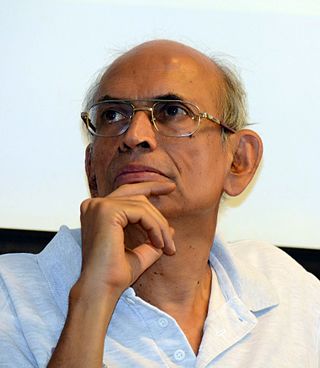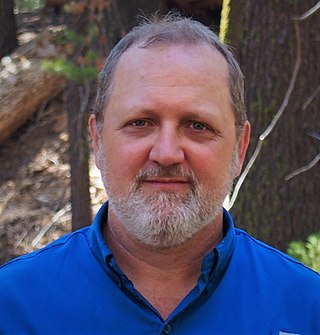Stephen P. Hubbell is an American ecologist on the faculty of the University of California, Los Angeles. He is author of the unified neutral theory of biodiversity and biogeography (UNTB), which seeks to explain the diversity and relative abundance of species in ecological communities not by niche differences but by stochastic processes among ecologically equivalent species. Hubbell is also a senior staff scientist at the Smithsonian Tropical Research Institute in Balboa, Panama. He is also well known for tropical forest studies. In 1980, he and Robin B. Foster of the Field Museum in Chicago, launched the first of the 50 hectare forest dynamics studies on Barro Colorado Island in Panama. This plot became the flagship of a global network of large permanent forest dynamics plots, all following identical measurement protocols. This global network now has more than 70 plots in 28 countries, and these plots contain more than 12000 tree species and 7 million individual trees that are tagged, mapped, and monitored long-term for growth, survival and recruitment. The Center for Tropical Forest Science coordinates research across global network of plots through the Smithsonian Tropical Research Institute. The program has expanded into the temperate zone, and is now known as the Forest Global Earth Observatory Network or ForestGEO.

Madhav Dhananjaya Gadgil is an Indian ecologist, academic, writer, columnist and the founder of the Centre for Ecological Sciences, a research forum under the aegis of the Indian Institute of Science. He is a former member of the Scientific Advisory Council to the Prime Minister of India and the Head of the Western Ghats Ecology Expert Panel (WGEEP) of 2010, popularly known as the Gadgil Commission.
Simon Asher Levin is an American ecologist and the James S. McDonnell Distinguished University Professor in Ecology and Evolutionary Biology and the director of the Center for BioComplexity at Princeton University. He specializes in using mathematical modeling and empirical studies in the understanding of macroscopic patterns of ecosystems and biological diversities.

Dame Georgina Mary Mace, was a British ecologist and conservation scientist. She was Professor of Biodiversity and Ecosystems at University College London, and previously Professor of Conservation Science and Director of the Natural Environment Research Council (NERC) Centre for Population Biology, Imperial College London (2006–2012) and Director of Science at the Zoological Society of London (2000–2006).
Richard J. Hobbs FAA, is an Emeritus Professor, ARC former Australian Laureate Fellow and ecologist at the University of Western Australia, Perth, Australia. He is a fellow of the Australian Academy of Science and a Highly-Cited author who has written extensively in the areas of vegetation dynamics and management, ecosystem fragmentation, ecosystem rehabilitation and restoration, landscape ecology, and conservation biology. His research focused on managing ecosystems in a rapidly changing world and the implications of environmental and biological change for conservation and restoration.
Robert Treat "Bob" Paine III was an American ecologist who spent most of his career at the University of Washington. Paine coined the keystone species concept to explain the relationship between Pisaster ochraceus, a species of starfish, and Mytilus californianus, a species of mussel.

Distinguished Professor David Lindenmayer,, is an Australian scientist and academic. His research focuses on the adoption of nature conservation practices in agricultural production areas, developing ways to improve integration of native forest harvesting and biodiversity conservation, new approaches to enhance biodiversity conservation in plantations, and improved fire management practices in Australia. He specialises in large-scale, long-term research monitoring programs in south-eastern Australia, primarily in forests, reserves, national parks, plantations, and on farm land.
Aaron M. Ellison is an American ecologist, photographer, sculptor, and writer. He retired in July 2021 after 20 years as the senior research fellow in ecology at Harvard University and as a Senior Ecologist at the Harvard Forest. He also served as deputy director of the Harvard Forest from 2018 to 2021. Until 2018, he also was an adjunct research professor at the University of Massachusetts in the Departments of Biology and Environmental Conservation. Ellison has both authored and co-authored numerous scientific papers, books, book reviews and software reviews. For more than 30 years, Ellison has studied food-web dynamics and community ecology of wetlands and forests; the evolutionary ecology of carnivorous plants; the responses of plants and ants to global climate change; application of Bayesian statistical inference to ecological research and environmental decision-making; and the critical reaction of Ecology to Modernism. In 2012 he was elected a fellow of the Ecological Society of America. He was the editor-in-chief of Ecological Monographs from 2008 to 2015, was a senior editor of Methods in Ecology and Evolution from 2018-2021, and since 2021 has been the executive editor of Methods in Ecology and Evolution.

Diana Harrison Wall was an American environmental scientist and soil ecologist. She was the founding director of the School of Global Environmental Sustainability, a distinguished biology professor, and senior research scientist at the Natural Resource Ecology Laboratory at Colorado State University. Wall investigated ecosystem processes, soil biodiversity and ecosystem services. Her research focused on the Antarctic McMurdo Dry Valleys and its Wall Valley was named after her. Wall was a globally recognized leader and speaker on life in Antarctica and climate change.

Exequiel Ezcurra is an Argentine-Mexican plant ecologist and conservationist. His highly interdisciplinary work spans desert plant ecology, mangroves, island biogeography, sea birds, fisheries, oceanography, and deep-sea ecosystems.

Marie-Josée Fortin is an ecologist and Professor in the Department of Ecology and Evolutionary Biology at the University of Toronto. Fortin holds the Tier 1 Canada Research Chair in Spatial Ecology at the University of Toronto. In 2016, she was elected as a Fellow of the Royal Society of Canada.
Nancy Huntly is an American ecologist based at Utah State University, where she is a Professor in the Department of Biology and director of the USU Ecology Center. Her research has been on biodiversity, herbivory, and long-term human ecology. She started her position at USU in 2011, after serving as a Program Officer in the Division of Environmental Biology at the National Science Foundation. Prior to that she was a faculty member in the Department of Biological Sciences at Idaho State University (Pocatello).
Erika S. Zavaleta is an American professor of ecology and evolutionary biology at the University of California, Santa Cruz. Zavaleta is recognized for her research focusing on topics including plant community ecology, conservation practices for terrestrial ecosystems, and impacts of community dynamics on ecosystem functions.

Ivette Perfecto is an ecologist and professor at the University of Michigan. Her work focuses on complex ecosystem dynamics and the application of ecological theories to agricultural systems.
Christine Goodale is an ecosystem ecologist and an Associate Professor in the Department of Ecology and Evolutionary Biology at Cornell University. Goodale conducts research that studies the cycling of water, carbon, nitrogen and other nutrients through forest ecosystems.
Jeannine Cavender-Bares is Professor of Organismic and Evolutionary Biology at Harvard University and Director of the Harvard University Herbaria. She is also Adjunct Professor in the Department of Ecology, Evolution & Behavior at the University of Minnesota. Her research integrates evolutionary biology, ecology, and physiology by studying the functional traits of plants, with a particular focus on oaks.

Bradley Cardinale is an American ecologist, conservation biologist, academic and researcher. He is Head of the Department of Ecosystem Science and Management and Penn State University.
Leah R. Gerber is a conservation biologist and environmental scientist most known for her contributions to the field of biodiversity conservation. She has conducted research on population ecology, conservation decision-making, and the application of innovative quantitative methods in conservation biology.
Rae Wynn-Grant is a large-carnivore ecologist and a fellow with National Geographic Society. She is best known for her research of the human impact on the behavior of black bears in Montana and is an advocate for women and people of color in the sciences.
Jianguo "Jingle" Wu (邬建国) is a Dean's Distinguished Professor of Sustainability Science at Arizona State University in Tempe, Arizona. He is also known internationally for his research in landscape ecology and urban ecology. His areas of expertise include landscape ecology, biodiversity, sustainability science, ecosystem functioning and urban ecology. He is the author of over 300 publications, 14 books and has translated 1 book from English to Chinese. He has been awarded multiple awards and honors, including being elected as a Fellow for the American Association for the Advancement of Science (AAAS) in 2007 and an Ecological Society of America fellow in 2019. In 2019 and 2020, Wu was chosen as one of the most influential researchers in the world by Web of Science in the fields of Environment and Ecology (2019) and Cross-Field (2020) due to his collective published works being in the top 1% most cited over the last decade. Since 2005, Jianguo Wu has also served as the editor-in-chief of the international publication Landscape Ecology.








